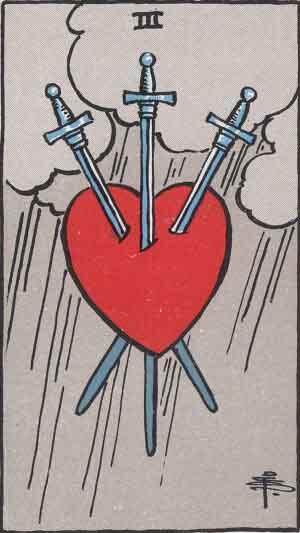The Three of Swords is one of the most evocative cards in the tarot deck, often depicting a heart pierced by three swords under a stormy sky. Its imagery conveys pain, heartbreak, and emotional challenges. When this card appears in a reading, it symbolizes a period of emotional turmoil, separation, or loss. However, it also carries a deeper message about growth, understanding, and eventual healing.
When interpreted as how someone sees you, the Three of Swords reveals perceptions rooted in sadness, difficulty, or vulnerability. This card may indicate that you are viewed as someone navigating emotional struggles or dealing with the aftermath of a significant challenge. Whether in love, career, health, or spiritual development, the card suggests that the observer recognizes your resilience in the face of adversity. Let’s explore how the Three of Swords might manifest in different areas of life.

Three of Swords As How Someone Sees You in Love and Relationships
For singles, the Three of Swords suggests that others may see you as someone still healing from a previous relationship or disappointment. This perception might lead them to believe you are hesitant to open your heart fully. In new relationships, this card indicates that your partner might sense unresolved emotions, perhaps fearing that your past experiences could impact the budding connection. In existing relationships, the Three of Swords might symbolize that your partner sees you as struggling with ongoing conflicts or misunderstandings, possibly viewing you as someone in need of reassurance and clarity. When asking about getting back together with an ex, the card could mean that they see you as deeply affected by the breakup, perhaps questioning whether reconciliation is possible without reopening old wounds.
Three of Swords As How Someone Sees You In Career And Business
If you are starting a new job, the Three of Swords may suggest that your colleagues or superiors view you as someone transitioning from a difficult period, possibly uncertain but determined. When currently employed, this card can signify that coworkers see you as dealing with workplace conflicts or personal challenges that affect your professional demeanor. During career changes, the card might indicate that others see you as courageous but also as someone recovering from previous disappointments or failures. For those starting a new business, it could reflect others perceiving your venture as a response to a challenging experience, seeing you as someone who is motivated by personal growth and determination to succeed despite past hardships.
Three of Swords As How Someone Sees You in Health
Physically, this card could signify that people perceive you as someone dealing with a health condition that weighs heavily on your mind. They may notice signs of fatigue, tension, or the toll of emotional stress on your body. Mentally, the Three of Swords suggests that others might see you as coping with sadness, grief, or psychological struggles, recognizing your need for compassion and support. This perception often underscores the importance of acknowledging your emotional needs to foster healing and balance.
Three of Swords As How Someone Sees You in Spirituality and Personal Development
When manifesting abundance, this card suggests that others may see you as someone overcoming blocks or setbacks that hinder your progress. They might recognize your determination to push through difficulties and find clarity. In aligning with spiritual goals, the Three of Swords indicates that you are seen as someone seeking meaning and purpose amid emotional trials. Others may view your journey as inspiring, reflecting your courage to confront pain and transform it into wisdom and growth.
Practical Tips for Working with Three of Swords As How Someone Sees You
To address the challenges indicated by the Three of Swords, it is essential to focus on self-care and emotional healing. Start by acknowledging your feelings and giving yourself permission to process them fully. Journaling or speaking with a trusted friend or therapist can provide valuable outlets for emotional expression.
In relationships, communicate openly about your feelings and past experiences to build trust and understanding. In your career, seek ways to manage stress effectively, such as through mindfulness or work-life balance. Practicing gratitude and setting clear boundaries can also help you navigate challenges in a healthy way.
Spiritually, use this period as an opportunity for introspection and growth. Meditate on the lessons learned from your pain and visualize the healing and transformation you wish to achieve. Affirmations and rituals focused on release and renewal can help you align with your goals and embrace your resilience. Over time, you will shift how others see you by embodying strength and clarity.